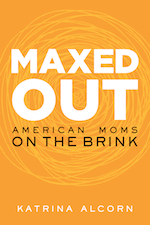Have you ever felt you had to hide the fact that you have kids when you’re at work?
I’ve been thinking about a comment Lily left on the blog about a week ago. Lily works in academia, where it sounds like it’s an open secret that being a parent is a professional liability. She wrote this:
I generally don’t talk too much about my kids in the work setting. A woman colleague mentioned to me that she didn’t realize that I had children until knowing me for over a year. She wasn’t married yet but said she could understand why I would omit references to family in the work setting…Very recently, a senior person, “Joe,” told me that he felt that my keeping references to children to a minimum was an “appropriate professional posture” to take.
Lily’s comment made me think about an argument I had when I was in grad school–I got my masters in journalism from UC Berkeley in 1999. One of my fellow students told me he had carefully scraped the Sierra Club bumper sticker off his car, and renounced his membership with that and all do-gooder type organizations. Why? He didn’t want to appear to have a bias when he started working for a newspaper.
I was appalled that he was willing to do this. I found the whole idea so de-humanizing. Don’t we all have a stake in having clean air to breathe, and clean water to drink? Don’t we all, no matter what our politics, benefit from having a beautiful, well-kept state park to visit on summer vacation? Do we really have to pretend not to have any skin in the game to be considered professional and “objective”?
Back to Lily. The pressure she feels to pretend she doesn’t have kids is very real. Experts say the “make it or break it” career years are between age 30 and 40. Unfortunately, these are the years when most many women* have their children.
In other words, the years we’re supposed to be putting in extra time to prove ourselves at work coincide with the years we are most likely to be pregnant, on maternity leave, sleep-deprived, and breastfeeding. It’s also when we are more likely to get sick and need to take time off to care for sick kids, attend parent-teacher conferences and other school events, and cover the random school holidays like Cesar Chavez Day and spring break. Not coincidentally, these are also the years when women in academia and other professions very often drop into the “second tier,” careers, the dreaded Mommy Track. They go part time and lose the coveted tenure track positions. [1]
So it follows that if you want to stay in the game, you pretend you don’t have these shamefully expensive, time-consuming habits named Betty and James. And if, (heaven forfend!), someone finds out you have children, well, just make it clear that someone else is taking care of them. You won’t let them create any actual demands on your time.
I’m lucky that I never felt the pressure to “pass” as a non-parent at my jobs, but I do know the pressure to compete with colleagues who seem to have a endless bounty of evening and weekend time to move their careers ahead.
I would like to offer the idea that all of us, parents and non-parents, have skin in the game. We all have vested interest in each other’s well-being. I’m even willing to bet that if we could all make room for our humanity in the workplace–whether it’s our membership in the Sierra Club or the parenting club–people would be happier and more productive and everyone would benefit.
[1] Mary Ann Mason & Eve Mason Ekman, “Mothers on the Fast Track” 2007
From pages 4-5: It is between ages thirty and forty that women change career direction. This is the decade which I call the “make-or-break” years, when women are most likely to drop into the second tier. The demands of a first job in the fast track male-dominated professions are daunting. This is the time when sixty- to eighty-hour work weeks are not uncommon, and when extreme flexibility, including moving or constant travel, is often a job requirement.
But for women, this probationary period also coincides with the decisive years for motherhood. Very few women have children after age forty….Mothers, but not fathers, will take some time out of the workplace, from a few months to a few years. They may hope to return to the fast track position they left, but most will fall into a second tier position.
* As my friend Kat pointed out, the average age women in the U.S. have their first child is 24.9 years old. It seems that this number has been going up over the last few decades, many of us put off having children until we’re established in our careers. Thanks for the correction, Kat!





{ 5 comments… read them below or add one }
I left academia in my mid twenties in ABD status. One day I looked up and realized all my female mentors and beloved professors were childless….something I wasn’t interested in becoming. I have since sold out and become a librarian and, still, am feeling the 30 to 40 mommy-tracking, wherein I bypass applying for supervisory positions b/c I am unwilling to work nights and weekends and whereby management assumes family is more important to me than my career. I suppose it is but I continue to scratch my head and wonder why I can’t be professionally ambitious and a successful parent at the same time? So while I envy those who came after me and have now risen ahead of me, I am happy that I get to tuck my kids in every night and drop them off at preschool every morning. Right now, I’m merely grateful for the privilege of pumping breastmilk in my own cubicle. Something is *wrong* with the working world when that seems like a luxury.
I had my first child at 32 (my second at 35) and now less than one year away from 40, I feel stuck in that second (3rd???) tier. I work in academia, but in a very family friendly department where people know I have children – know my children even – as they were here with me as babies on a regular basis. Even in this lower tier, in a family friendly environment, I still feel like I have to hide the TRUTH. I haven’t slept, eaten, fully prepared for the training or gone to the bathroom. I am holding back tears of stress some days but feel if I cannot come out. Not even to close friends at work. Even the sympathetic ear loses turns away when faced with the realities. It is too much too often, and frankly, too gross. We have to pretend we are okay and all is possible.
oh Holly! I feel your pain. I bet, though, that even those without kids haven’t fully prepared for the training either. And I’d like to think we’re that much stronger because we can wait (and wait) to go to the bathroom. There’s no easy answers, and I find it so strengthening to find that I’m not alone in the craziness of parenting small kids and trying to work.
and rebecca – I really like how you put that:”professional ambitions” vs. successful parenting.” I know I’ve made decisions in the past few years to lower my professional ambitions, in part to make space in my life for successful parenting (or so I hope).
The question that nags me, though, is what happens on the other side? What happens when the parenting has been so successful that it begins to wind down? Can we ramp up our professional ambitions in 10 or 15 years? Will we want to ramp up our professional ambitions in 10 or 15 years? I’m sure it varies widely in by industry, but I’d love to hear from parents on the other side of this chapter of parenting.
WOW! Dead on! I work in academia and the hardest thing is finding a place to belong. I have three kids, am only 29 years old and I DO NOT talk about my kids in the workplace. Its kind of that silent known that people know I have kids or do not know unless others mention it. Most people dont even think I am married for some reason. I partially choose to keep to myself about things in my personal life around here becuase as with what happens in most other working environment rumors fly. I sacrifice becuase I do not attend the social functions that others my age that are childless have because I DO have kids. Its a phenomenon in academia working environments I believe and yes it sucks but it only makes us stronger as moms.
I treasure the content on your web site. Thnx.
{ 1 trackback }